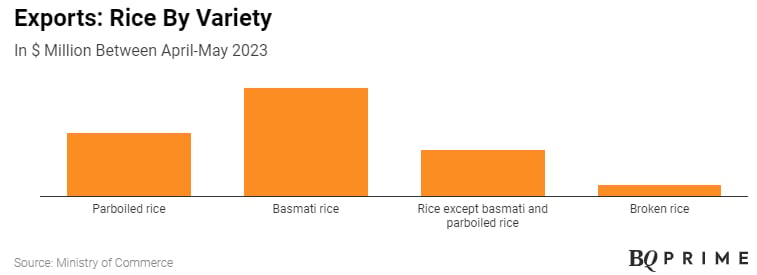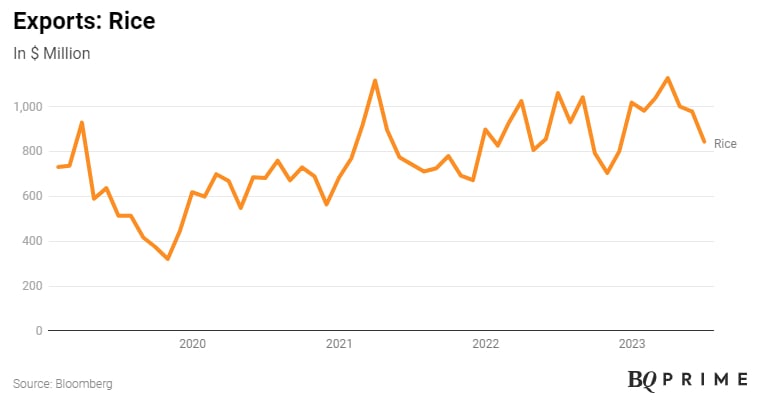May 25, 2025 | 16:52 GMT +7
May 25, 2025 | 16:52 GMT +7
Hotline: 0913.378.918
May 25, 2025 | 16:52 GMT +7
Hotline: 0913.378.918

Prices of rice are unlikely to ease immediately despite supply-side interventions by the Union government. Exports of non-basmati white rice were prohibited to ensure adequate availability and allay price rises in the domestic market, according to a notification by the Ministry of Consumer Affairs, Food, and Public Distribution on July 20.This was preceded by the imposition of an export duty of 20% on non-basmati white rice last September.
Despite the imposition of duty, exports saw a rise from 33.7 lakh tonne between September 2021 and March 2022 to 42.1 lakh tonne between September 2022 and March 2023. The sharp increase in exports can be attributed to the high international prices due to the geopolitical scenario, El Nino, and extreme climatic conditions in other rice-producing countries.
There is no change in the export policy of parboiled rice and basmati rice, which form the bulk of rice exports. This will ensure that the farmers continue to get the benefit of remunerative prices in the international market, according to the release.
Non-basmati white rice constituted about 25% of total rice exported from the country. The prohibition on export of non-basmati white rice will lead to lowering of prices for the consumers in the country, the release said.

Price Rise Continues
The domestic prices of rice continue to rise, as retail prices increased by 11.8% in June, according to data from the Ministry of Statistics and Programme Implementation. That's the highest since 2015. Data for earlier period is unavailable. Retail prices have held steady, as the all-India average was recorded at Rs 40.96 per kg as of July 31. This was 2% higher than a month ago and 10.6% higher than a year ago, according to the data from the Department of Consumer Affairs.
Adequate Stock The total production of rice in 2022–23 is estimated at a record 1,355.4 lakh tonne, higher by 60.7 lakh tonne compared to the previous fiscal, according to the third advance estimate of the Ministry of Agriculture and Farmers Welfare in May.
Currently, stocks of food grain in the central pool are adequate to meet domestic demand despite falling to a three-month low in July. The Centre currently stocks 243.5 lakh tonne, according to data from the Food Corporation of India.
Will Prices Ease?
The government's blanket ban is expected to reduce India's rice exports by about 4–5 billion tonne this fiscal, or more than a fifth of what was exported last fiscal, according to Pushan Sharma, director of research at Crisil Market Intelligence and Analytics. That should improve domestic supplies and have a moderating effect on retail prices.
India's overall exports of rice have witnessed a spike despite previous government measures amid a decline in central stocks and a rise in domestic prices. The government clearly viewed these as red lines from a domestic food security and inflation point of view, according to Sharma.
Despite the September curbs, rice inflation rose from about 9% year-on-year then to about 12% in June, and daily data suggests a further rise in July, Nomura Holdings Inc. said in a note. Domestic inflation could still be impacted by higher global prices if they spill over into the unrestricted categories, Nomura said. "We expect continued supply-side interventions, with inflation likely to be above 6% levels in July and August, buoyed by sky-high vegetable prices."
However, global rice prices are likely to take a hit as India accounts for about 40% of global rice exports, according to Nomura. Within Asia, the Philippines is likely to be most impacted, while Singapore, Hong Kong, and Malaysia also depend on imports to meet much of their rice needs. Thailand could gain because it is a net rice exporter, it said.
(BQprime)

(VAN) Alt Carbon has raised $12 million in a seed round as it plans to scale its carbon dioxide removal work in the South Asian nation.

(VAN) Attempts to bring down the price of the Japanese staple have had little effect amid a cost-of-living crisis.

(VAN) Fourth most important food crop in peril as Latin America and Caribbean suffer from slow-onset climate disaster.

(VAN) Shifting market dynamics and the noise around new legislation has propelled Trouw Nutrition’s research around early life nutrition in poultry. Today, it continues to be a key area of research.

(VAN) India is concerned about its food security and the livelihoods of its farmers if more US food imports are allowed.

(VAN) FAO's Director-General emphasises the need to work together to transform agrifood systems.

(VAN) Europe is facing its worst outbreak of foot-and-mouth since the start of the century.